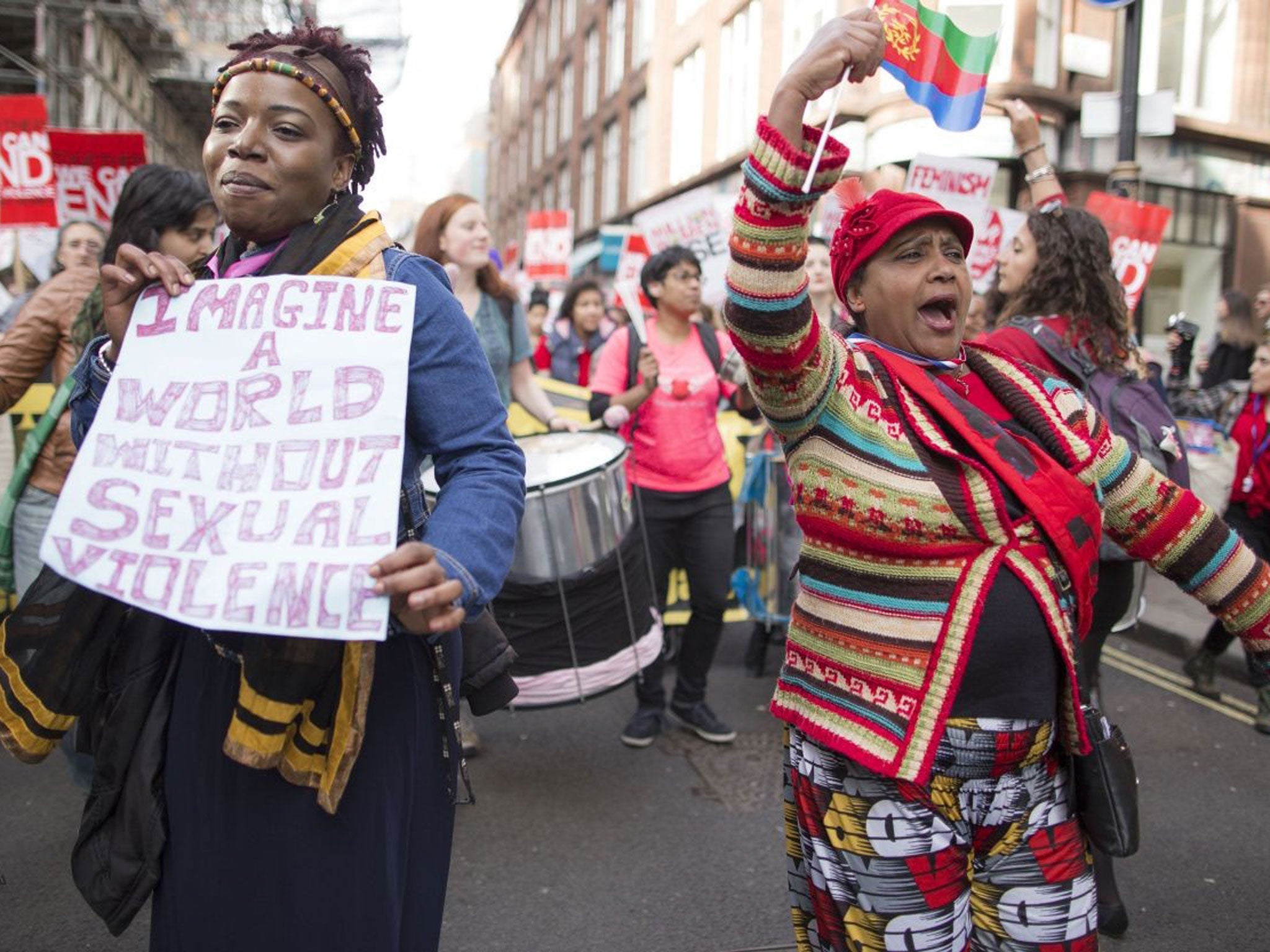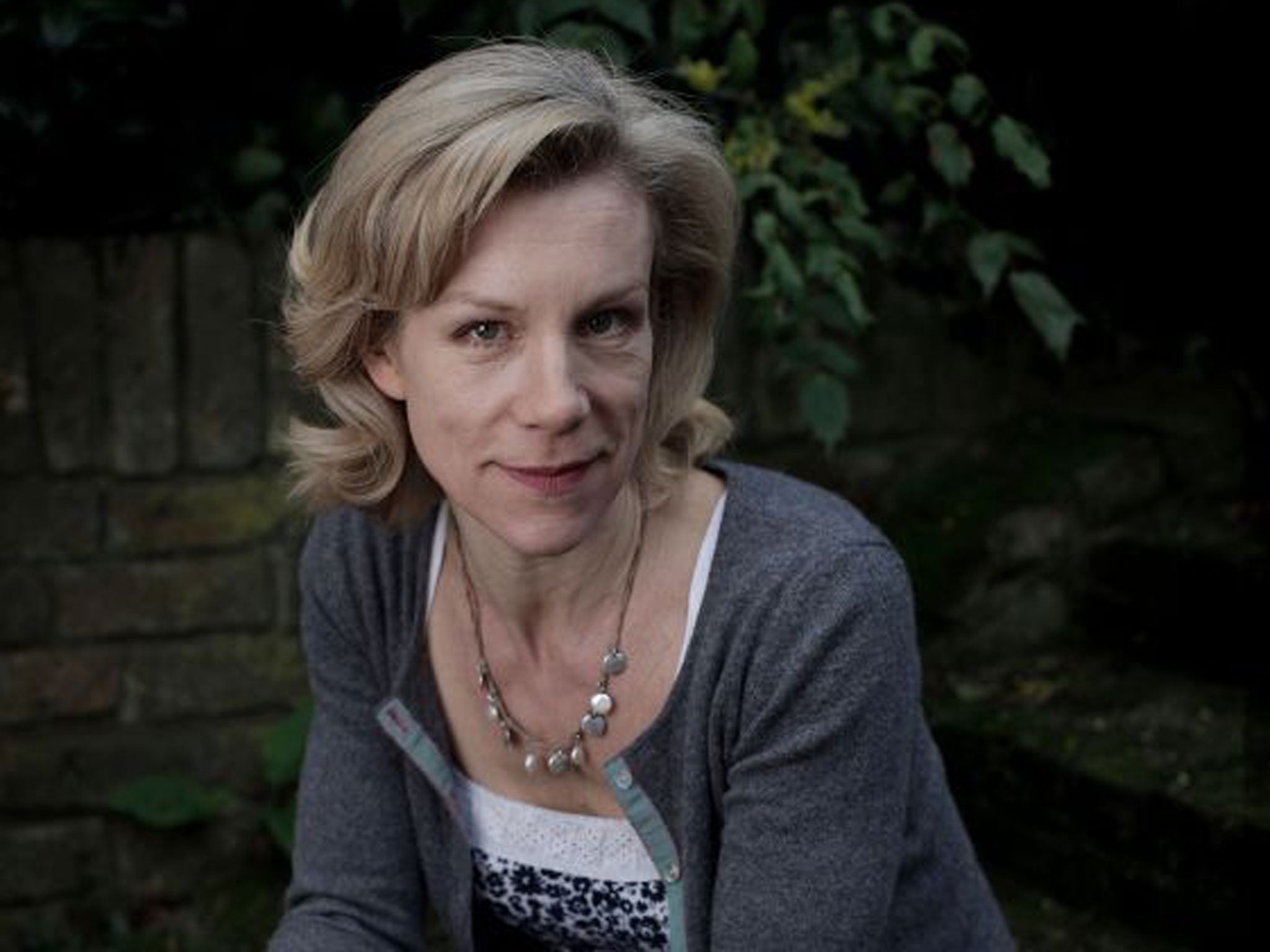International Women's Day: Where do we go next on the road to global equality?
Women have a long way to go in the worldwide battle against gender imbalance, as well as the violence and sexual abuse they suffer. Sarah Morrison reports on the persistent problems that affect half the population

It is the day after the night before. Plays were performed, films broadcast, speeches given and thousands marched on the capital's streets to mark International Women's Day yesterday. But what, if anything, is next?
Global equality does not seem likely. One in three women worldwide has experienced violence or sexual abuse; 140 million women and girls globally have been subjected to female genital mutilation; 215 million women cannot access contraception; about 14 million young girls will be married this year.
Yet campaigners around the world have not given up. With 364 days left until the next landmark, The Independent on Sunday asked seven women, from politicians to activists and actors, what they thought were the biggest issues facing women this year.
Defending the Human Rights Act
Shami Chakrabarti; Director of Liberty
"Find me a sphere of life untainted by gender inequality and I'll be impressed – it's probably the biggest global injustice we face. This year an election looms, but already the gloves are off and anti-human rights rhetoric abounds. Our Human Rights Act protects women from abuses ranging from sexual assault to slavery, and we need to entrench such protections, not scrap them. If we don't all step up and fight for the Act this year, we may well lose it. And women will be among the hardest hit."
Sexual Violence in Conflict
Jemima Khan; Writer and Unicef ambassador
"The long-term effect of rape and abuse can be catastrophic both physically and emotionally. A recent report by the UN Secretary-General on sexual violence in conflict gives a sense of the horrifying scale of the problem – reporting on sexual violence from Somalia to South Sudan to Syria. In the Democratic Republic of Congo alone, approximately 1,100 rapes are reported every month, with an average of 36 women and girls raped every day. The Foreign Secretary [William Hague] has played a leading role in focusing international attention on sexual violence in conflict. We now want to see that international political will translated into practical action at the Global Summit to End Sexual Violence in Conflict in London in June. The UK Government must ensure that global leaders commit to concrete measures to protect not only women but also children. We want child survivors of violence to have access to justice – to feel safe to come forward and to hold their abusers to account. The Global Summit to End Sexual Violence in Conflict is an unprecedented opportunity for change."
Britain's young
Laura Bates; Founder of the Everyday Sexism Project
"From young women raising their voices to fight against female genital mutilation to students who are rebelling against a culture of misogyny at UK universities, we are seeing a real revolution as a whole new generation of young women is standing shoulder to shoulder alongside more seasoned feminists to stamp out sexism and gender imbalance, once and for all. Issues that were once dismissed and brushed under the carpet are no longer being ignored, and young people are taking the fight to a new frontier using social media to organise and campaign."
Honour-based abuse
Jasvinder Sanghera; Founder of Karma Nirvana
"Honour-based abuse is what underlines all abuse: FGM, forced marriage and all the other oppressive practices. It's committing crimes in the name of so-called honour – to protect a family's reputation. You understand you have the power to bring shame and dishonour to your family. From eight years old, I understood I wasn't allowed to cut my hair, or sit in the presence of boys. I had to dress modestly and not take part in social activities that my peers took part in, like going to the school disco or going swimming. I was told it was dishonourable. Families that operate under the honour system are self-policing. You can be significantly harmed, or whipped off to Pakistan to marry somebody. They deal with the victims as they want and the world doesn't see it. We have come a long way when it comes to forced marriage: we have a forced marriage unit, and soon it will be a criminal offence. But where there's forced marriage, there's always honour-based abuse. I'd like the Government to give us a definition of what it is. I'd like to see every police force in the UK be inspected in how they deal with it and get trained."
Detention of female asylum-seekers

Juliet Stevenson; Actress
"It's a brutal, shameful aspect of government practice. For a long time, I've been deeply concerned about the issue of detaining people who come to this country seeking sanctuary. We need to remind everybody that this is a legal right. Many come from an experience of extreme brutality, almost always rape and very often having had to leave children behind. They had to escape through extremely dangerous circumstances and yet, almost all of these women's experiences in this country are as bad and brutalising as the experience from which they fled. It's shocking to see how they're treated in Yarl's Wood [detention centre] when you think they haven't committed any crime. The Home Office is making a lot of mistakes; it has a culture of refusal – that's its default position. There's a culture of fear and loathing. All three parties are vying for electoral popularity, [but] it's urgent to separate the asylum question from immigration; they're very different. We need to reinvest in legal aid, re-educate the Home Office and make sure these issues are separate. It's an inhuman system."
Female Genital Mutilation (FGM)
Fahima Hashim; Director of Salmmah Women's Resource Centre in Sudan
"FGM takes away the dignity of a woman as a sexual being. We had a proposed law to criminalise it [in Sudan] but the article has been removed. I produced advocacy materials defining danger and consequences of FGM to a woman and gave it to the men of my family to read. On the eve of the day my cousin was going to do it to his daughters, he changed his mind. Those women are now young mothers with young ones of their own. FGM remains a big issue, but so is sexual harassment, rape and the way it's dealt with in society. There are violations everywhere; crimes against women and humanity. Women are lashed here for what they wear, or for adultery. Women are not given the space to exert themselves. They're degraded and aren't part of society or an agent of change. We need to provide information about sexuality and [enable] women to look at themselves as sexual beings. I'm still hopeful. All the beautiful women in my country, including my daughter and niece, deserve to live in dignity."
Childcare
Gloria De Piero; Shadow Women and Equalities minister
"Listening to women across every part of the country, the one thing that comes up more than anything is childcare. Where is the progress when the cost of even part-time childcare is now more than a mortgage, and women still feel they have to choose between their career and their family? That's why we need to expand free childcare for three- and four-year-olds and ensure access to breakfast and after-school clubs, helping women and their families."
London's annual Million Women Rise march sees thousands call for end to violence
Thousands of women marched through the streets of central London yesterday calling for an end to violence against women. Crowds walked down Oxford Street and gathered in Trafalgar Square to hear music and speeches from activists.
The seventh annual Million Women Rise march fell on International Women's Day, seeking to highlight all forms of female exploitation and abuse in the UK and around the world.
Myriad nationalities converged on a sunny afternoon, with demonstrators decked out in colourful outfits. Beating drums and dancing, they sang: "Power to the women. Women got the power. Sister can you hear us?"
Andrea Johnstone, 50, a charity worker from Bournemouth, was marching in London for a third year. She said: "Women aren't here to be abused. That's not what we were put on the planet for." Student Phoebe Heptinstall, 18, who marched with her mother, voiced concerns about women in music videos portrayed as sex objects "as if their only worth were their tits and arse".
Demonstrators called on the Government to increase funding to female charities that look after victims of abuse and to overhaul the justice system to prosecute more male sex offenders. Other demonstrations and marches were held around the world, from Paris to Los Angeles to Sydney.
Alex Delmar-Morgan
How feminism can achieve its goal? It's child's play
Have you ever asked a six-year-old girl how feminism can achieve its goal? You should. The answer, it turns out, is quite simple. "Boys and girls should all be treated equally," according to Lottie Goodchild. "Some places they are, but not others. To make it equal, you've got to pass the news on. Get lots of people involved to stop this."
The young feminist, who wants to be a doctor, vet and dentist (all at the same time) when she grows up, has already done her part. She spent yesterday afternoon discussing feminism and celebrating International Women's Day at the Women of the World (WOW) Festival in London. All her fellow debaters were under 10 years old.
Activist Malala Yousafzai, fashion designer Vivienne Westwood and artist Grayson Perry, who are all scheduled to attend the festival this weekend, might have dominated the headlines, but it was at WOW's over-subscribed Under 10s Corner – where 15 already thoughtful girls talked while seated on brightly coloured bean bags – that the big issues were discussed.
"Are boys and girls the same?" "What does feminism mean?" "What toys do you play with?" and "What is it like in your playground?" were just some of the questions asked by playwright and poet Caroline Bird, who facilitated the event.
She was stuck by the growing awareness about equal rights among young girls. "[In some ways] they are a lot more progressive than the adults around them," she said.
One girl said she had been stopped from playing with boys in her school playground. Another said she was allowed to play with boys, but was often treated differently because she was a girl. Another had been teased for being a feminist ("The boy said I must hate boys"). But it got really heated when they were asked about toys being marketed differently for boys and girls – did you know there are boy and girl Nerf guns?
On one point there was unanimous agreement: kids should have their say. "You shouldn't have to be a certain age to care about feminism, because it's something that's wrong in the world," said eight-year-old Ella Kiely. Esme Leaman-Hill, eight, agreed. "It isn't fair for men to be better than women and to get dreams while women cook and clean."
Becky Goodchild, seven, summed it up: "They should all be good to each other. They're both equal."
Sarah Morrison
Join our commenting forum
Join thought-provoking conversations, follow other Independent readers and see their replies
Comments
Bookmark popover
Removed from bookmarks